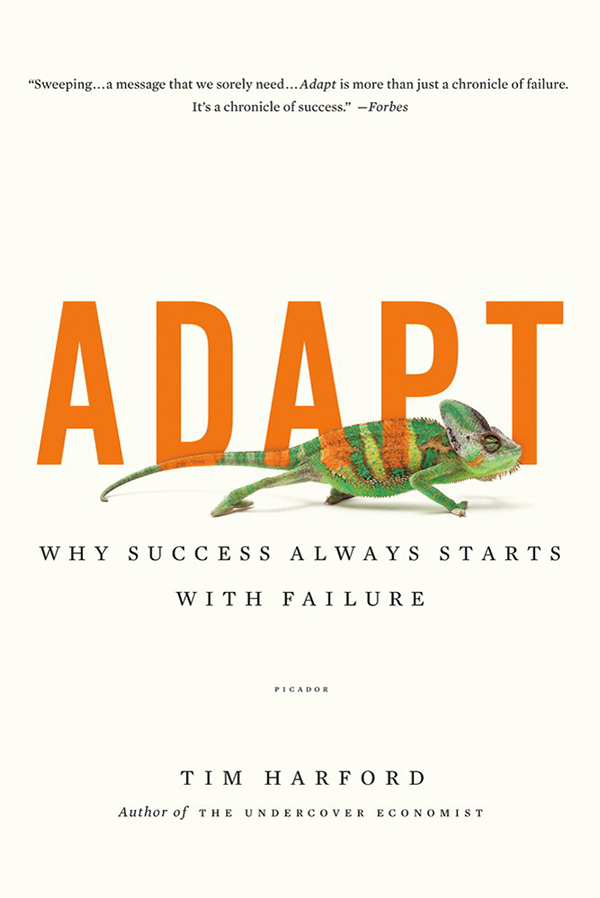The Book in Three Sentences
Seek out new ideas and try new things. When trying something new, do it on a scale where failure is survivable. Seek out feedback and learn from your mistakes as you go along.
Adapt summary
This is my book summary of Adapt by Tim Harford. My notes are informal and often contain quotes from the book as well as my own thoughts. This summary also includes key lessons and important passages from the book.
- The Toaster Project was when one man tried to build a toaster from scratch and realized the insane levels of complexity required.
- Our world is stunningly complex, but we are so engulfed in this complexity that we take it for granted. We are blind to it.
- We overestimate the impact any one person or leader can have because we fail to see how complex the problems are that current leaders face.
- The system we live in is far too complex for any one person to understand. Even developing expertise in a particular area isn't as useful as you would expect because of the interrelatedness of things with my areas you know nothing about.
- Failure is everywhere. Ten percent of American companies disappear every year.
- Perhaps the reason companies don't stay at the top is simply because the only way to go is down. It's really hard to stay at the top and perhaps being a Fortune 100 company relies on many factors outside your control and not simply running a good company. When those factors change, so does your incredible success.
- The market fumbles its way to success. The good ideas take off and less successful ones die out. It's like evolution for economics.
- Avoid survivorship bias. Don't just see success. See all the failures that led to the eventual success.
- The process of evolution strikes a balance between discovering the new and exploiting the familiar.
- The evolutionary mix of small steps and occasional wild gambles is the best possible way to search for solutions.
- Evolution produces ongoing “works for now” solutions and then builds upon those ideas.
- We are more blind than we think.
- Most real-world problems are more complex than we think.
- Seek out new ideas and try new things.
- When trying something new, do it on a scale where failure is survivable.
- Seek out feedback and learn from your mistakes as you go along.
- For some reason, we are obsessed with achieving uniformly high standards in industry even though it is precisely the opposite (variation and selection) that got us this far in the first place. In fact, if, for example, every hospital did things the same way, we would struggle to improve because nobody would test new ideas.
- There is a limit to how much honest feedback most leaders want to hear.
- Accepting trial and error means accepting error. And human brains don't seem to be very good at doing that.
- “A person who has not made peace with his losses is likely to accept gambles that would be unacceptable to him otherwise.” -Kahneman and Tversky
- John Endler's guppy studies from the 1970s showcase how environment drives evolution.
- Make sure you know when you've failed. Measure your progress.
- Measurement can come in many forms. For example, Whole Foods requires new employees to do a four week trial period and they are only hired if they earn positive votes from 2/3 of their coworkers. This is a form of peer monitoring (or we could call it peer measurement).
- Google's 20 percent time is another example of peer monitoring because good side projects will gain the interest of peers.
- In a company where your peers decide who stays around, there is no room for people who don't pull their weight.
- 80 percent of Google's projects will fail, but that doesn't matter. People only remember the 20 percent that succeed.
- “Success is the number of experiments that can be crammed into 24 hours.”
- Formal theory won't get you nearly as far as an incredibly rapid systematic process of trial and error.
- Niche products grow and usurp incumbents precisely because they appeal only to a few users and seem inferior to incumbents. They get ignored long enough to grow into a serious threat.
- Fascinating reason new ideas get sabotaged within organizations: if new business models catch on they often require people with new skills and that means any big wig in the current business will lose status. So they consciously or unconsciously sabotage new ideas because they are inherently threatening to the career they have spent years building. Yet another reason you must be constantly willing to reinvent yourself.
- If you're going to fail in public, best to do it in front of a limited audience. You need a relatively safe space to fail.
- Hedonic editing is a way of avoiding thinking about losses and mistakes by convincing ourselves they aren't that bad.
- The three obstacles that prevent us from learning from our mistakes are 1) denial, 2) self-destructive behavior, 3) remembering past mistakes as triumphs.
- Our response to failure should be, “I am not a failure, but I have made a mistake.”
Reading Suggestions
This is a list of authors, books, and concepts mentioned in Adapt, which might be useful for future reading.
- Phillip Tetlock's examination of expertise and the Cold War
- Paul Ormerod's research on evolution and economics
